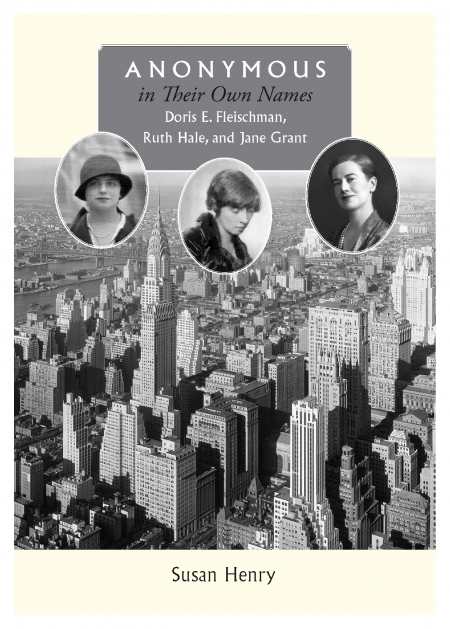Anonymous in Their Own Names
Doris E. Fleischman, Ruth Hale, and Jane Grant
- 2012 INDIES Finalist
- Finalist, Biography (Adult Nonfiction)
Three remarkable lives, intertwined via social circles, professional achievements, and a shared commitment to progressive ideas: if only this trio were men, everyone would know their names. Alas, it is their three husbands whose names we know better: Henry L. Bernays, “father of public relations,” Harold Ross, founding editor of The New Yorker, and Heywood Broun, influential newspaper columnist. Yet each of the women, whose lives are scrupulously chronicled in this book, made hugely substantial, professionally astute contributions to their husband’s ventures. All three were ardent early feminists, refusing even in the 1920s to relinquish maiden names; all inhabited Manhattan at a heady time for media and social life; all three worked in journalism or affiliated fields; and all married later than the expected norm because they were already working as full-time professionals.
Doris E. Fleischman (married to Bernays), Ruth Hale (married to Broun), and Jane Grant (married for a critical time to Harold Ross), were the ultimate strong women behind successful men. But they did not work in their husband’s shadows, exactly; among certain knowledgeable fellow professionals, their skills and savvy were known and often acknowledged—especially, and somewhat unusually for the time, by their husbands.
And yet, when the biographies were written, the posthumous accolades dispersed, the media histories assembled and passed down, their names dissolved behind those of their husbands. Susan Henry, Professor Emeritus of Journalism at California State University, Northridge, sets the record straight with this meticulously researched book that presents separate but overlapping biographies in one volume. She’s assembled a primer crammed with facts, history, detail, and anecdotes that traces these three eventful lives and carefully puts their accomplishments and complicated marriages in perspective. Henry’s done something else, too—crafted biographies that are important on an entirely different level for post-feminist women whose modern experiences often differ vastly from, while still resembling, theirs.
Along the way, this book lets readers peek behind office and parlor doors at the early organization meetings that birthed The New Yorker, the founding maneuvers of the PR profession, and the hardscrabble and fashionably gritty salad days of New York journalism. In the end, it tells the truth that most know but rarely acknowledge: women were there, these three especially.
Reviewed by
Lisa Romeo
Disclosure: This article is not an endorsement, but a review. The publisher of this book provided free copies of the book to have their book reviewed by a professional reviewer. No fee was paid by the publisher for this review. Foreword Reviews only recommends books that we love. Foreword Magazine, Inc. is disclosing this in accordance with the Federal Trade Commission’s 16 CFR, Part 255.

